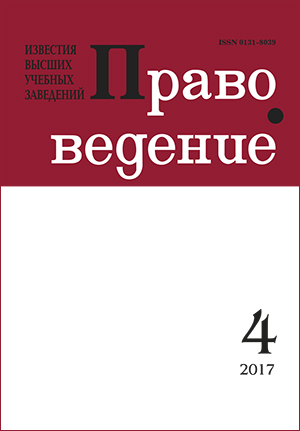Уголовный кодекс Индии 1860 года: история создания и характерные черты
Аннотация
В статье рассматриваются история уголовно-правовой системы Британской Индии в XVIII–XIX вв., значение Правовой комиссии при генерал-губернаторе и личный вклад ее председателя Т. Б. Маколея в дело кодификации уголовного права Индии, источники и особенности структуры Уголовного кодекса 1860 г., его доктринальное и практическое значение вплоть до наших дней. Индийское право было полисистемным и включало две персонально-религиозные системы: индусское и мусульманское право. Официальная кодификация права в Индии стала возможной при генерал-губернаторе У. Бентинке, когда за дело взялся его юридический советник Т. Б. Маколей. Он составил проект Уголовного кодекса Индии в период с 1835 по 1837 г. На содержание проекта повлияла жесткая уголовная политика У. Бентинка, связанная с противодействием ритуальной преступности — группировкам тугов (разбойников-душителей) и практике сати (самосожжения вдов). Члены комиссии находились под сильным воздействием утилитарной философии Дж. Бентама, сторонника «всеобщей кодификации права». На проект повлиял «Кодекс Ливингстона» 1826 г. в североамериканском штате Луизиана, где проводилась последовательная гуманизация наказаний: отмена смертной казни, размежевание норм уголовного права и уголовного процесса, обособление «общей части» в структуре Кодекса. Систематизация колониального права Индии была комплексной и межотраслевой, она содержала элементы как кодификации, так и консолидации. Успешность УК Индии на практике была связана с систематическим подходом реформаторов, которые параллельно выработали такие базовые акты, как Гражданско-процессуальный кодекс 1859 г., Уголовно-процессуальный кодекс 1861 г., консолидированные Законы о полиции 1861 г. и доказательствах 1872 г. и др. В основе успеха этой широкомасштабной межотраслевой систематизации и унификации права лежали веские утилитарные причины, прежде всего необходимость обеспечить надежное управление и правопорядок на обширной территории нестабильных индийских княжеств.
Ключевые слова:
кодификация права, правовая реформа, колониальное законодательство, уголовный кодекс, индусское право, мусульманское право, источники права
Скачивания
Библиографические ссылки
Загрузки
Опубликован
Как цитировать
Выпуск
Раздел
Лицензия
Статьи журнала «Правоведение» находятся в открытом доступе и распространяются в соответствии с условиями Лицензионного Договора с Санкт-Петербургским государственным университетом, который бесплатно предоставляет авторам неограниченное распространение и самостоятельное архивирование.




